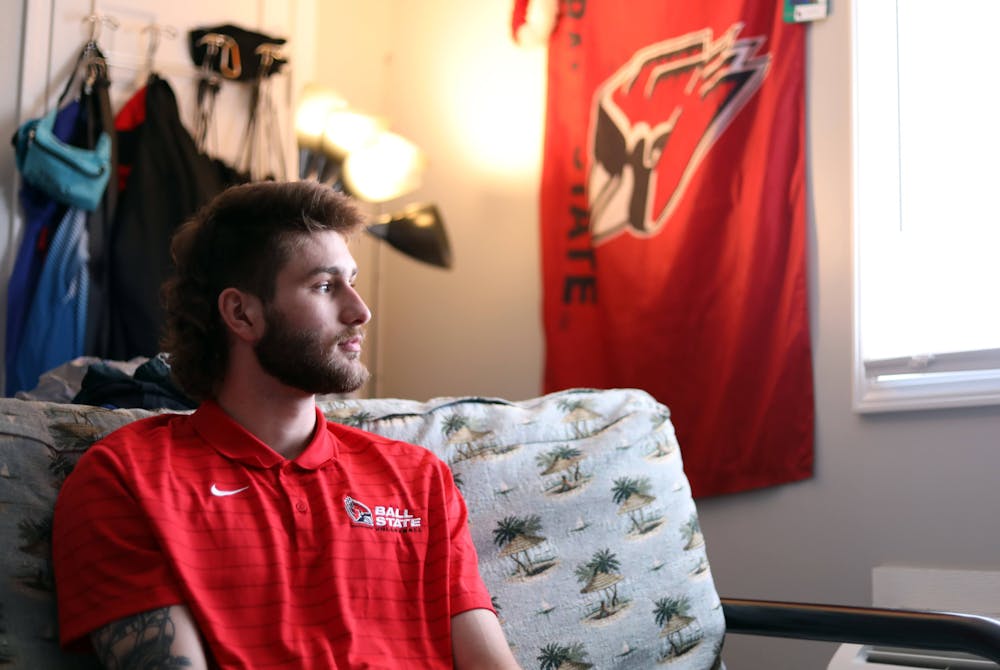It was late October.
Wil McPhillips and his roommates were hosting a private party. According to McPhillips, an uninvited group came into the house and was quickly asked to leave. When they refused to leave, punches were thrown before the group left the house, but they congregated on the property outside the home.
McPhillips and a few others went outside to confront the group, where the fighting continued while moving further from the house.
Then McPhillips heard gunshots.
He thought somebody had shot a gun into the air to stop the altercation.
He was wrong.
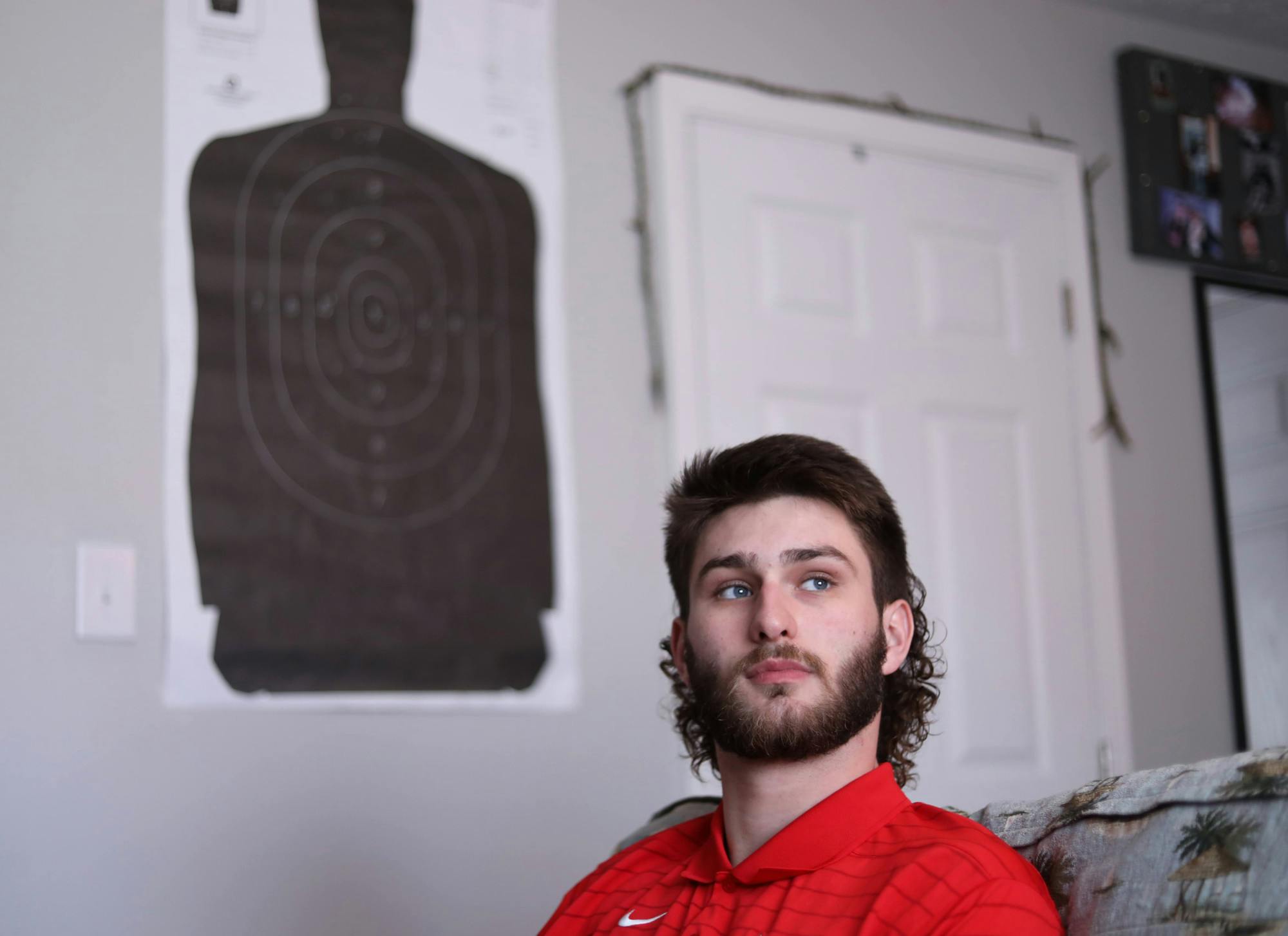
‘Am I going to live?’
As everyone ran, McPhillips knew something was different. His breathing was labored and felt like he was ‘soaked.’
He soon realized that the two gunshot wounds in his chest caused the feeling. He had been shot from behind.
“I called the cops because no one was by me; I was by myself at this point,” McPhillips said. “I didn't fall or anything. I just kind of walked away from where the fight was and called the cops. And then I saw a cop car drive past.”
The patrol car had not seen him, so he chased them a few blocks to get their attention. As he ran – what ended up being two or so blocks – he plugged the open wound in his side with his finger.
“I just felt a big sense of urgency, really. I pretty much knew that I felt like at any point I could just fall down,” McPhillips said. “I literally told [the police], ‘I’m going to go ahead and sit or lay down before I fall down.’”
McPhillips was transported to Ball Memorial Hospital and rushed into emergency surgery for his collapsed lung, which had split at the top as a result of the shooting. Additionally, the surgical team performed exploratory surgery, cutting open from his breastplate to his belly button to ensure that he was not bleeding internally.
He lost eight units of blood and needed 67 staples.
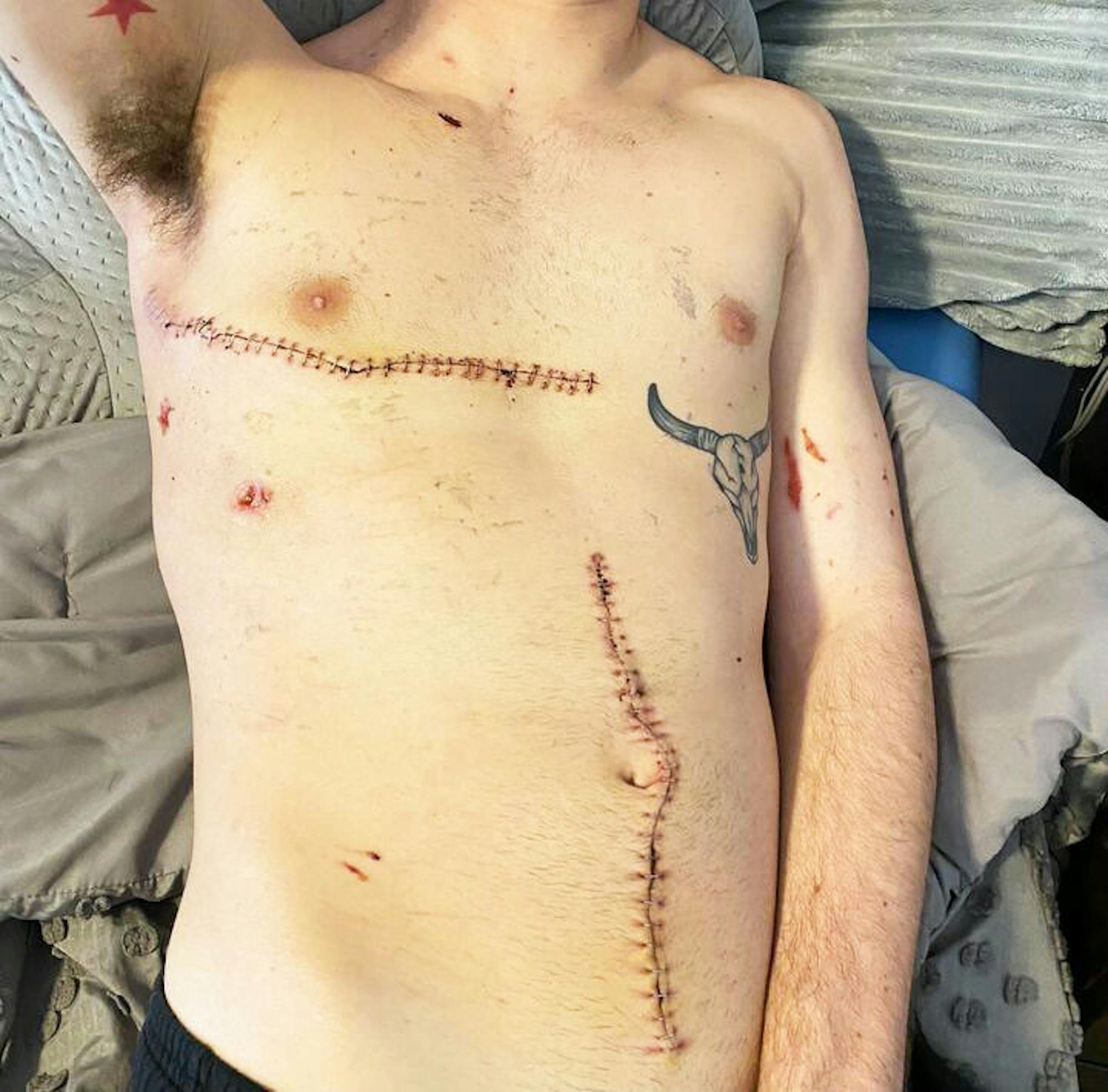
The moments on the operating table, when he was still conscious, are etched into his memory.
“I was awake on the operating table asking them if I was going to be okay, and they were like ‘We’re trying to help you out,’” he said.
McPhillips was put into a medically-induced coma to give his body time to heal. They put a mask over his face, ‘some big’ needles into his chest as he closed his eyes and contemplated if these were the final moments of his life.
“I was just looking around, and I was like, ‘Dang, this is it,’” McPhillips said. “I just felt helpless.”
After about 24 hours, he woke up alone in his hospital room with multiple IVs, a tube going down his throat and a tube coming out of his side. He could only communicate with a dry-erase board.
McPhillips said he had two questions when he woke up: ‘Do my parents know?’ and ‘Am I going to live?’
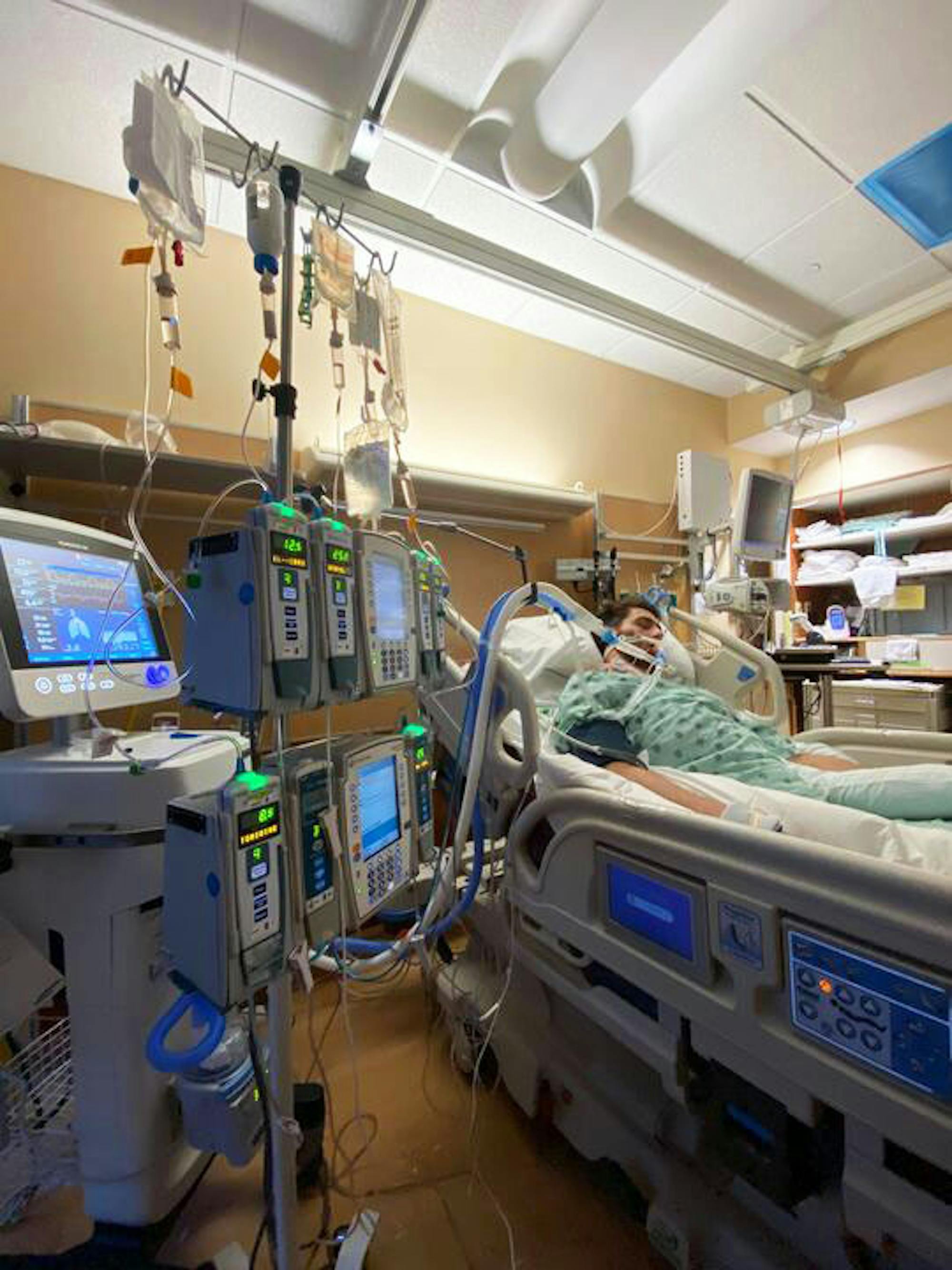
“This is the Muncie Police Department, your son has been shot.”
The night of the shooting, McPhillips’ family was home in Tennessee. Bob, Wil’s father, was spending the night in Clarksville, Tennessee, with Wil’s older sister Sarah; they were about two hours away from Wil’s mother, Karen, who was an hour and a half southeast of Nashville in Winchester, Tennessee, with her sister. Karen recalls a normal night with wine and television.
“The most ironic thing is, the thing I was watching on TV was a ‘20/20’ episode of a college with a group of kids at a college house and one of their football players was sitting on the front porch, it was a party, and he got shot,” Karen said. “I thought, ‘Oh my God, those poor parents, that’s horrible.’”
She thought nothing more of it and headed to bed, only to be awakened by the early morning phone call no parent ever wants to receive.
“This is the Muncie Police Department, your son has been shot.”
Karen remembers sitting on the side of the bed, trying to wake up from what had to be a bad dream.
“[They said] your son has been shot multiple times, and I just kept saying, ‘Why? I don’t understand,’” she said.
She still has the piece of paper on which she scribbled the information, but said she doesn’t recognize the handwriting today.
The next few minutes were filled with frantic phone calls to the hospital, the police department and Wil’s friends before waking her sister with the news.
“We were just screaming and pacing in the front room, and I’m like, ‘Oh my God, I have to call Bob,’” Karen said.
Everyone’s reaction was the same: confusion, shock, panic. They had to get to Muncie.
“I was just on autopilot of some sort…I don’t remember driving to Clarksville,” Karen said.
After picking up her husband, Karen insisted on driving. They knew the route from numerous trips to Muncie, but amid the chaos, they found themselves going in the wrong direction.
“I was pretty much in shock,” Bob said. “I was trying to put it [together] because first off, they said it was three shots, and I’m thinking ‘How’s he still around?’ It turned out there were two, but that’s bad enough… Just a lot of trying to figure out sort of in my head, ‘How does this kind of stuff happen?’”
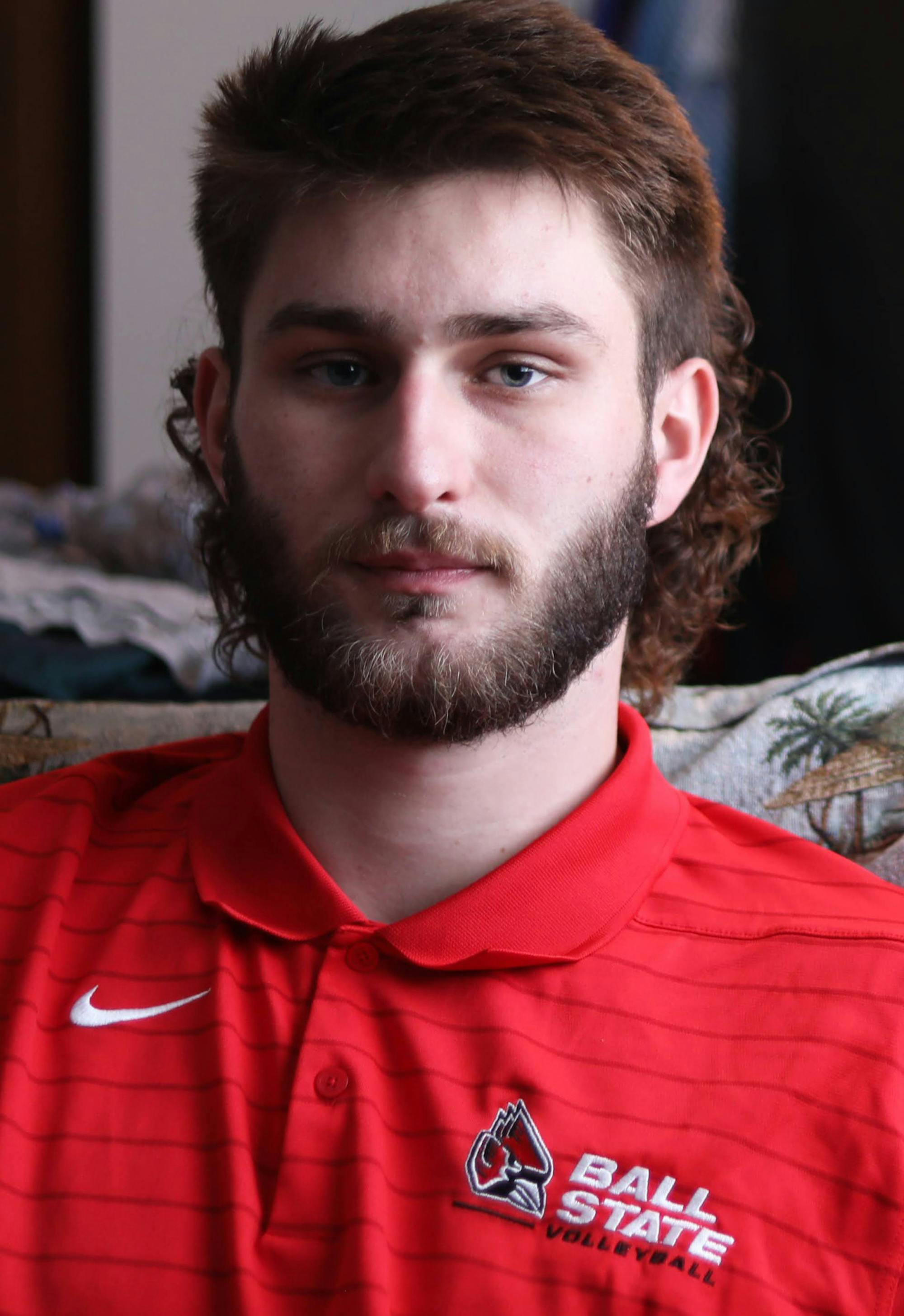
After Bob and Karen got on the road, Sarah stayed behind with her three kids. She somehow needed to be a mother, while the sister in her could barely handle the current situation.
“I couldn’t go back to sleep,” Sarah said.
“The next day was really hard because it was Halloween,” she continued. “I just had to be an actress because I didn’t want my kids to know because I didn’t know [if everything was alright].”
Bob and Karen made it to Ball Memorial Hospital after leaving midway through the night and were greeted at the door by senior setter David Flores, one of Wil’s closest friends.
“He looked like a ghost,” Karen said of Flores.
Karen’s voice still shakes when she talks about the walk to Wil’s room.
“I said ‘I don’t know if I can go in there,’ and the nurse said ‘You’ll be fine, you’ll be fine.’ I was not fine,” she said. “ To walk in and just see your son there with a breathing tube – they call it a mainline IV – hooked up to machines and lifeless, I pretty much dropped to my knees.”
“Usually I would be the strong one for others in the room, I couldn’t [in that moment],” Karen continued.
They stayed at the hospital for a few hours talking to doctors and other personnel before staying with one of Wil’s friends for the night. When they came back in the morning, Wil’s breathing tube had been removed.
Seeing his parents in his hospital room was a moment Wil said was hard to describe.
“That’s kind of a blur,” Wil said. “Just the fact that I’m lucky that I am not dead… If [the shooter] would have been any closer to me or any farther, a different bullet… It was pretty much inches [and] I could have been paralyzed.”
Bob said that Wil was lucky because the bullets were target rounds, a less effective round.
“I talked to people in the know about [ammunition] and they said ‘Thank God that they were target rounds,’ because if they were anything else, he would not have survived,” Bob said.
The bullet casings were recovered at the scene, but the shooter has yet to be apprehended as of Oct. 4.
“We couldn’t have asked for anything else.”
Bob and Karen hadn’t attended any matches during the COVID-19 pandemic, and because a new coaching staff came in during the off-season, they first met Wil’s coaches in his hospital room.
They also did not know many of the families around the team or the staff with Ball State Athletics, but said the support was overflowing between their people back home and their people in Muncie.
“A lot of support between Ultimate Volleyball Club back home, all of the families…and same with the [Ball State] teammates and families that we didn’t even know on his team,” Karen said.
“I want to thank the doctors at Ball State, the two surgeons that worked on him, the lung doctor and the exploratory surgeon, those nurses, coach Donan [Cruz], the coaching staff and [former Director of Athletics] Beth Goetz… we couldn’t have asked for anything else,” she continued.
It was a few days later when Sarah would talk to Wil for the first time since the shooting.
“I was taking my girl to school, and we pull into the parking lot and Wil calls me,” she said. “That was the first time hearing him since everything happened, so I was a mess on the phone naturally… I don’t even remember what we talked about, I just remember what it felt like to hear him for the first time.”
Sarah had her first child, Raelynn, when Wil was 12, and he took on the big brother, or the ‘Funkle (Fun Uncle)’ role, as Sarah likes to say, for Raelynn and Sarah’s two younger sons Remmington and Lucciano. Raelynn went to all of Wil’s practices in high school; she cries when he comes home to visit, and she cries when he has to leave.
“She’s grown up watching him play volleyball,” Sarah said. “She talked to him on the phone, and he talked to her as much as he could, but it was really hard for him emotionally.”
When Wil took his first steps, Karen remembers looking up to see him walking around the corner with two nurses by his side after being taken off his breathing tube about an hour prior. Wil met his mom for a hug before asking her, ‘Am I ever going to play volleyball again?’
Karen – who refers to her son as ‘Strong Wil,’ – said she had no doubts that he would see the court again.
“I was just happy to be alive”
When Wil walked out of Ball Memorial Hospital a week later, his Ball State team was there to greet him.
The road to recovery was beginning, but for months after leaving the hospital, Wil felt like he could barely breathe.
“That was more of a mental thing and freaky,” he said. “Like going to bed, I wasn’t sure if I could keep myself breathing automatically throughout the night.”
He dealt with the aftereffects of the shooting for several months, including the pops and vibrations in his lungs when he inhaled or the blood he coughed up for three months.
For a long time following the injury, Sarah remembers it bothering Wil that he had to concentrate on breathing while everyone else did it autonomously.
“He was almost bitter because he was like, ‘I feel weird to be in a room with people who are not thinking about breathing,’ and I could sympathize but not empathize,” Sarah said.
Wil went home to Tennessee to recover while working with the local hospitals in his area. The months following were spent dealing with numerous challenges, including a bout of pneumonia.
During recovery, Karen tended to his injury and surgical wounds, which needed to be cleaned consistently. Wil joked that the hospital just “sends you home with holes. They don’t sew ‘em up.”
Karen said ‘When it’s your kid, you’re going to do it, obviously,’ but she thanked God that she had the courage to do it.
After Wil returned to Muncie, the team began to travel for preseason. That weighed on Wil mentally.
His five-person volleyball house was empty.
“I was able to hang out with them and, obviously, I wanted to be freaking playing, but I was happy to just be alive,” Wil said.
With little connection to his teammates, Wil stayed connected to his family through phone calls and texts almost eight hours away.
“While he was with us, it was CT scans, medication, all of that stuff, but by the time he went back to Muncie, and we stayed here, it was a more emotional, mental adjustment for him back there,” Karen said. “So trying to support him and always trying to have a positive thing [was hard]. I just felt like, ‘Ugh, I can’t be there.’ But he found his way through.”
As the Cardinals began their season, Wil was able to attend matches, dressed in sweatpants and a polo, holding his arm against his right side to protect his wounds. The only thing he could focus on was his academics and his recovery.
There was a three-step process for Wil to return to the court: First, he needed to get medically cleared to work out again, second, he needed to be cleared by the athletic training staff to finish his rehabilitation, and third, to work with Jason Roberson, Ball State’s director of strength and conditioning for Olympic sports, in final preparations to play again.
With the athletic training staff, Wil spent a lot of time scraping his scars – a technique called dermabrasion which can improve the scarring and help remove damaged or unhealthy scar tissue. While making sure his scars would not clump up or affect the tissue, Wil spent a lot of time on the stationary bike to get his lungs back into good shape. Roberson said that when Wil got to him, his lungs were ‘quite healthy.’
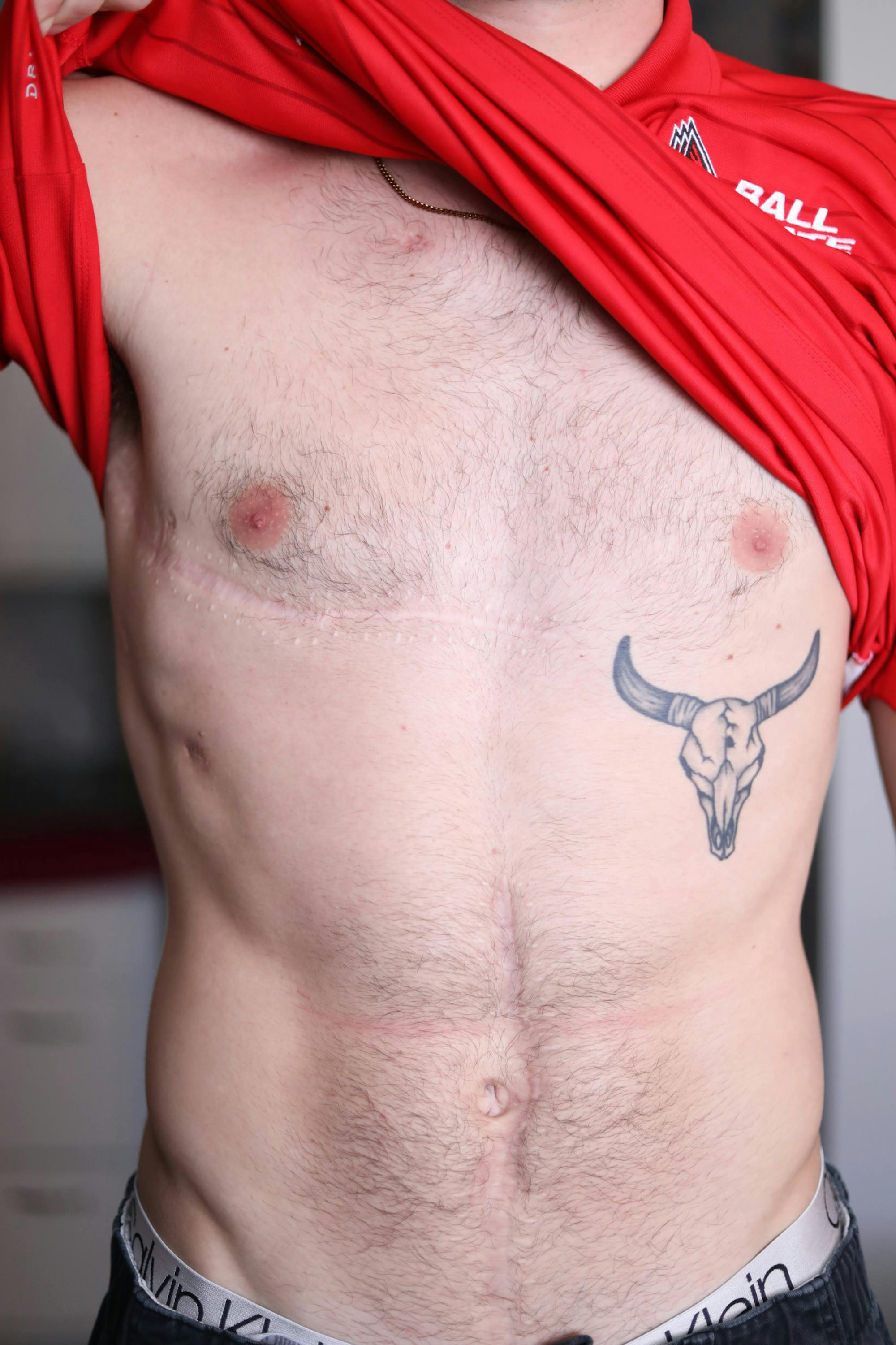
“We started with a very slow progression,” Roberson said. “The musculature was all healed, all the connective tissue, muscle and bone had been healed by that point, but because he had been out for so long, I really took my time to make sure he could rebuild any lost muscle tissue. We started with really light weights, mostly movement-oriented…Over the course of a couple of weeks, we built him up to using barbells.”
“He was back to doing really well,” Roberson continued. “He’s such an athlete, such an incredible young man. I'd never seen him work this hard in the entire time that I’d been working with him.”
Part of Wil’s work ethic was driven by his absence from the court. He could watch practice, but not participate.
“Wil McPhillips loves volleyball, and that's all he wants to do right now,” Roberson said. “That was 100 percent motivation for him to do everything he had to do to get back on the court.”
Up until March 2022 (about five months after the shooting), there was still a possibility that Wil could return before the end of the season, but as spring rolled around, he was losing hope.
“I would do anything to get back to playing, and I just didn’t want to miss out on a whole year,” Wil said. “When the doctor told me that I probably wouldn’t play for the rest of the year, I was pretty bummed out for sure.”
Wil remembers hitting a ball again for the first time March 15, 2022. As he became more and more comfortable on the court again, he became frustrated; he felt the progress he was making but was not yet cleared to play.
“I was telling the trainer, ‘I’ve been hitting balls. I’ve been jumping. Everything’s fine,’ so like, why could I not go into practice and like do the warm-up and do light stuff just to make my mental [health] feel better.”
By the end of April, he was a full participant in practice with the team, but the final call was that Wil would not see the court for the rest of the season. He would have to wait until November 2022 to make his comeback.
446 days
Wil first saw playing time again in Ball State’s home opener against non-conference opponent Harvard Jan. 20, 2023. As the Cardinals huddled in the locker room before heading out to the court, Wil found out he wouldn’t only be playing his first game, he’d be starting it.
“They took a moment in the locker room and had a couple of the other guys who play my position take a second for all the work I did,” he said. “That was really cool for them to do [and] definitely made it more special than it already was.”
With the lights darkened and the crowd roaring, Wil sat on the bench with his head down. It had been 446 days since the shooting. As Steve Shondell, public address announcer, rang his name into the rafters, Wil experienced a feeling that he wasn’t sure he would ever feel again.
He took the court in a Ball State uniform in front of the home crowd, which included his older sister and his niece.
“[After the game] I was crying, I hugged him, and he was very sweaty,” Sarah said. “It was quick, but it was so special.”
Over 400 miles away, Bob and Karen remember being on their feet, cheering in front of their TV during Wil’s return to the court. Wil played all three sets of the sweep and contributed eight kills and three blocks.
Wil saw time in seven matches (23 sets played) in his first season back, tallying 29 kills and 17 total blocks while averaging a .404 hitting percentage.
“I think about [the shooting] every single day, but it still doesn’t feel like reality,” Wil said. “It’s weird, but I don’t really have a choice. I don’t have a choice in how to feel about it. Really, I’m just going to keep rolling with it and seeing what I can do.”
It was an emotional moment for Roberson as well, who oversaw Wil’s recovery, from returning to practice and then taking the court again in a competitive match.
“To watch him practice, and participate in practice and watch him build up, knowing that he was going to play, it was incredibly heartfelt,” he said. “A lot of emotion around. Proud of him, proud of his work ethic, proud of how hard he worked to get back to where he was.”
‘It could have been worse’
Halloween has always been a special holiday for the McPhillips family. Karen makes a special dinner and the family gets together, but since Wil’s shooting, it won’t ever be the same.
“It weighs heavy,” Karen said. “I feel that boiling anxiety, but I’m trying not to make it that.”
“To not say it’s different would be a blatant lie, but in the same breath, we are thankful that he’s still here with us,” Bob added.
The family has adopted ‘It could have been worse’ as a mantra over the last two years, in addition to Karen’s ‘Strong Wil’ nickname.
“I try to enjoy things more,” Sarah said. “When we’re out spending time with family or whatever, just absorbing it. Our lives here are precious and short and not guaranteed.”
Bob, who is nearing 70 years old, worked almost seven days a week in the trades when Wil was younger.
“For me, it’s enjoying the time you have with them,” he said. “When he comes in we try to do stuff with him. Before, when he was younger, I worked all the time…Now, I’m like ‘I got to spend time with him.’”
Life goes on for the McPhillips family, despite the entire experience sitting a little deeper every fall when the leaves change colors.
“I don’t think we live any differently,” Karen said. “I wanted him to have the college experience… [Bob and I] didn’t go away for college and we wanted him to have that experience and, boy, he got it. But he’s coming out stronger.”
With two more years of eligibility, Wil wants to utilize them by leaving a legacy for the program.
“I’m hoping to come in and make an impact that I’ve been waiting to make,” Wil said. “I played pretty much more my freshman and sophomore year than I did this past year, which kind of has been tough. But, I don't have a problem with playing a role [on the team] and I know how that goes.”
Wil, who has coached with Muncie Burris Volleyball and Munciana Volleyball Club in Delaware County, wants to play professional volleyball but knows when his playing days are done, he wants to coach. He believes his experience, while truly unique, can provide a great deal to potential players.
He reminds himself that he is lucky, and there were worse outcomes to his situation.
“Definitely remind myself of that, like throughout it, people have it worse,” Wil said. “I could walk, I could breathe, my arms were functional, I can still do what I love. For a little bit there, I was definitely scared. Being able to only take like half a breath for a couple months is terrifying.”
Wil is open and talkative about the shooting, even making jokes about his experiences. He said it’s who he has been since day one, no matter the setback.
“I try not to worry about little things, because it can end at any moment. Just try to enjoy what I can and not take things for granted,” Wil said.
Contact Daniel Kehn with comments at daniel.kehn@bsu.edu or on Twitter @daniel_kehn.

